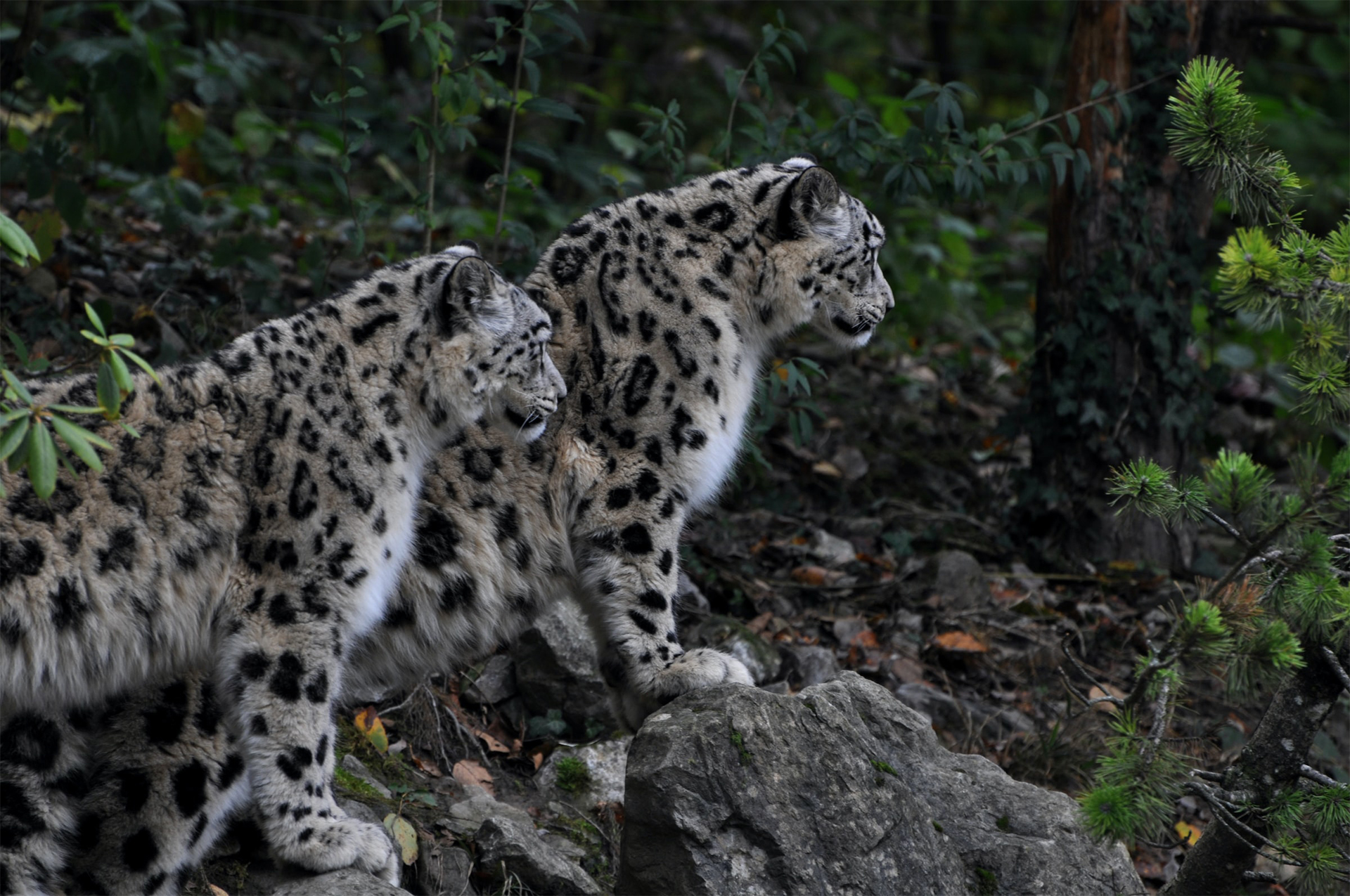Conjuring the Spirit of the Himalaya Ghost Cat
“Love at first sight,” is how conservationist Helen Freeman described meeting a pair of Earth’s rarest creatures one fateful day in 1972. Nicholas and Alexandra had made the long journey from Russia (then known as the Soviet Union), to be raised and studied at Woodland Park Zoo in Seattle, Washington. Their silvery white fur, marbled by dark rosettes, looked like bare trees in a snow storm. Their piercing eyes met Helen’s, and with unbridled compassion, she embraced the cubs as her own. The siblings were a big cat species so obscure, local communities had consigned their kind to the name, ‘Ghost of the Mountains.’ But Helen Freeman was determined to save them, and their snow leopard kin, from vanishing from their Himalayan home.
Freeman was volunteering for the zoo’s veterinary staff when she fell in love. The position was an unusual calling for a woman trained in business administration and born into a family of Greek immigrant café-owners. However, Freeman was drawn to animals and was curious to learn more about their behavior—a yearning that ultimately led her back to the University of Washington to earn a second degree.

The countless hours spent observing Nicholas and Alexandra developed into a multinational research project, launching a series of successful captive-breeding programs. In 1979, Freeman was promoted to the zoo’s Curator of Education and tasked with increasing public awareness about the threats snow leopards faced. She taught visitors about the importance of protecting endangered felines and preserving their natural habitat.
Though Freeman filled this role until 1986, she wanted to do more for the species. She believed the most effective way to save snow leopards from extinction would be to inspire the local communities in Asia who lived among them. So, with cultural identity and grassroots efforts at the heart of her mission, Freeman founded the Snow Leopard Trust in 1981. At the time of Freeman’s passing in September of 2007, the Trust employed a diversity of staff throughout China, India, Mongolia, Pakistan and the Kyrgyz Republic.
Her Leopard Legacy Lives On
On July 6, 2017, a male leopard was born at Seattle’s Woodland Park Zoo, carrying forward the legacy of Helen Freeman, for whom the cub’s mother was named in honor. The zoo celebrated with the following announcement: “Helen’s cub will be a wonderful ambassador for its wild cousins, and we’re very excited to welcome him to the world and to our backyard!”
Under Helen’s leadership, the Snow Leopard Trust fostered integral relationships with the global conservation community and established conservation and research programs across the 12 range countries (Afghanistan, Bhutan, China, India, Kazakhstan, Kyrgyz Republic, Mongolia, Nepal, Pakistan, Russia, Tajikistan and Uzbekistan—a range that covers an area of nearly 772,204 square miles, with 60 percent of the habitat found in China).
Woodland Park Zoo has remained an important ally throughout the organization’s 40+ years of existence. “Helen made a special connection with the snow leopards at the zoo and came to understand how these animals are conservation ambassadors for their cousins in the wild. Her drive to protect the species led her to build an organization that works with real communities to save these animals in their natural habitat. We miss Helen, but are proud to be part of helping her work and dream continue to succeed,” shared former Woodland Park Zoo President and CEO Dr. Deborah Jensen.
Throughout her illustrious career, Freeman consorted with Maharajas in India, trekked the Himalayas in Nepal, sailed the Yangtze River to Chungking in China and organized snow leopard symposia across the continents. She received numerous awards and acknowledgments for her achievements, including the Alumni Achievement Award from Washington State University in 1990, Acknowledgment of Appreciation from the U.S. Fish and Wildlife Service in 1997, the prestigious Evergreen Award in 1998–“In Recognition of Worldwide Partnerships in Wildlife Conservation and Understanding,” and also a medal of honor from the Woodland Park Zoological Society.

Save the Spirit of the Mountains with Nat Hab & WWF
Freeman’s tireless efforts to protect this snowy spectral are supported by Natural Habitat Adventures and World Wildlife Fund. More than 70 percent of snow leopard habitat remains unexplored. Through our innovative Travel Partnership, we are transforming how people perceive snow leopards with conservation through exploration.

Photographed by Nat Hab & WWF Expedition Leader © Surya Ramachandran
Snow leopards not only play a key role in managing prey species populations as an apex predator, but they are also sentinels of snow—melting snow that is. They serve as indicators of the impacts of climate change and human encroachment on the health of their high-altitude environments. If snow leopards thrive, so will countless other species, as well as the largest freshwater reservoirs of the planet. This big cat is under threat, however; poaching for their fur and bones, habitat fragmentation, prey depletion and retaliatory killings resulting from human-wildlife conflict are driving them to the edge.
In the Eastern Himalayas, WWF reduces human-leopard conflict by helping local communities install predator-proof pens for their livestock, create livelihood enterprises and innovate local insurance plans. WWF also works on public education programs, including with goat herders in Mongolia, to build awareness.
You can learn more about the snow leopard plight by watching the video below or any of the other Daily Dose of Nature webinars we host!
If you’re feeling adventurous, join us on our next trip to the Land of the Snow Leopard and search for these mysterious cats in the heights of Ladakh alongside top trackers and naturalists!

























